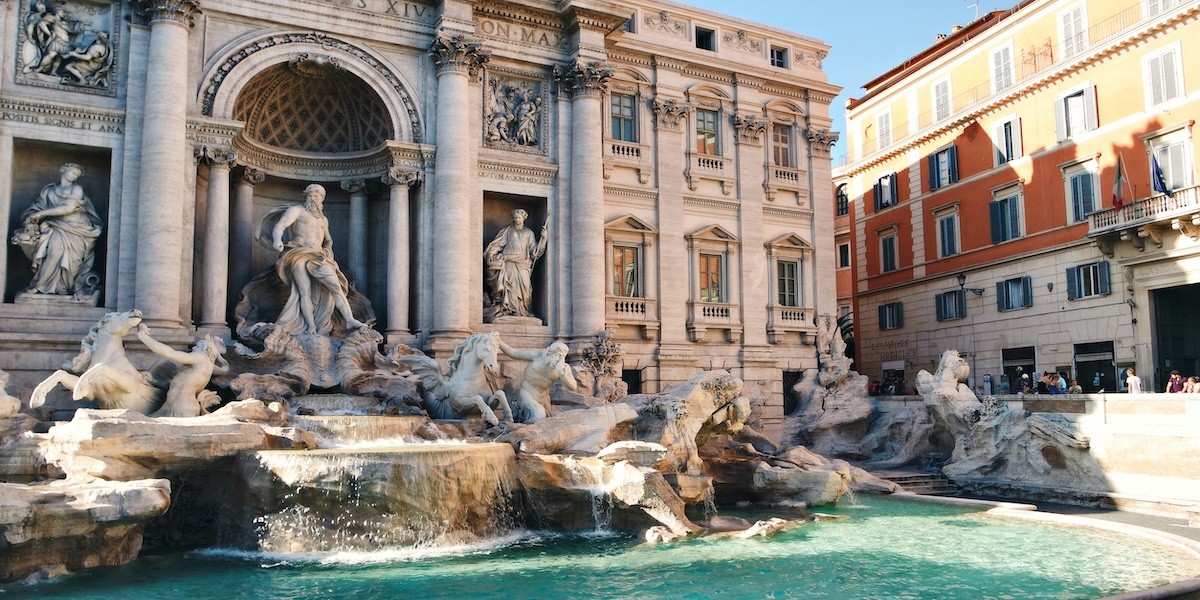
When the summer heat hits, tourists and locals alike look for ways to cool down — and sometimes that means jumping into public fountains. This is especially common in Rome, but you’ll see it across many of Italy’s beautiful cities too. However, bathing in these fountains comes with some serious consequences.
So, what exactly are the risks of swimming in a Roman fountain? And could it actually land you in trouble beyond just a fine?
Bathing in Rome’s fountains is strictly forbidden — here’s where it happens
During the hottest days, fines skyrocket. It’s not uncommon to hear about tourists being caught bathing in fountains around the city.
For example, in June 2025, three tourists were caught cooling off in the Barcaccia Fountain at Piazza di Spagna and the pools near the Altare della Patria. Together, they were fined €1,500.
What’s the fine for swimming in the Trevi Fountain?
It’s illegal to swim or bathe in any public fountain — even those that are works of art or hold great historical significance. In some cases, it’s more than just a fine; it could be a more serious offence.
City regulations spell out the penalties for breaking these rules, but harsher punishments can come into play, especially if there’s theft, damage, or public indecency involved.
Simply getting into a fountain, even just to dip your feet, can earn you a fine of up to €500. That’s the price you pay if you swim in the Trevi Fountain — one of Rome’s most famous (and unfortunately least respected) landmarks. Tourists and locals also often take a dip in the Fontana dell’Acqua Paola in Trastevere, nicknamed “Er fontanone der Gianicolo.”

What are the risks of swimming in Rome’s fountains?
The growing problem of people misusing public monuments pushed the city to introduce tougher rules in 2019. The new Urban Police Regulations include bans on:
- Bathing, even partially, in historic basins;
- Taking coins thrown into fountains by tourists (like in the Trevi Fountain);
- Washing, even partially, with running fountain water.
Breaking these rules can cost you between €160 and €450 in fines. But for more serious cases, penalties can be even harsher — sometimes including driving bans.
What is the Urban Daspo?
In the worst cases, these behaviours can be considered criminal offences — ranging from theft and damage to disturbing public order, especially if the person is disrespectful or aggressive.
Such offences can lead to criminal charges or an Urban Daspo — a legal order that immediately removes the person from the area and bans them from returning for a set time.
Introduced in 2017, the Urban Daspo is a flexible tool aimed at protecting cities from disrespectful behaviour and urban decay — not just around fountains but in many public places.
When does the Urban Daspo come into play?
This order can be applied to people who camp out in city centres, harass residents or tourists, vandalise property, or run unauthorised businesses.
Anyone hit with an Urban Daspo must leave the area straight away and can’t return for up to two years, depending on the severity or repeat offences. It’s commonly used in sensitive places like train stations, airports, hospitals, and schools.
Ignoring the order can lead to fines between €100 and €300 — or even stricter penalties if the person keeps breaking the rules.
Camping near fountains: what’s going on?
Camping or loitering near historic monuments has become more frequent. People often rest by fountains to escape the heat, sometimes eating or even sleeping on nearby pavements.
While the line between simply visiting and behaving inappropriately can be thin, cities are cracking down to protect their historic sites from picnics, impromptu showers, and the hygiene and order problems they cause.
What to do instead on hot days: beaches near Rome
Remember, Rome has plenty of public drinking fountains — the famous “nasoni.” They might not be artistic, but they provide fresh, clean water to drink, fill your bottles, or splash on your face and hands. Used properly, they’re a great way to stay cool.
To avoid fines and keep things hassle-free, visitors are encouraged to spend the hottest days at one of the beautiful beaches near Rome, where swimming is allowed and perfectly safe.

